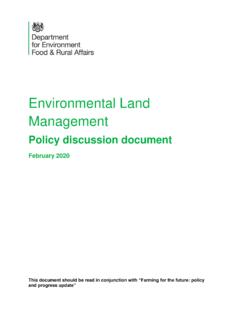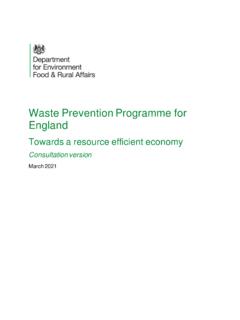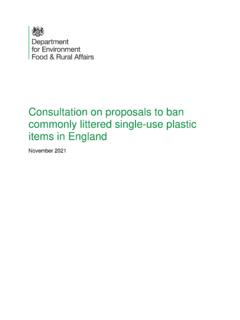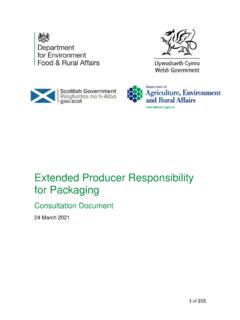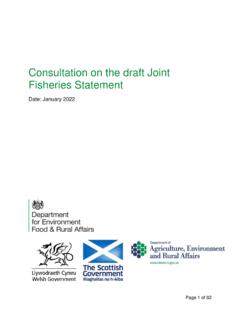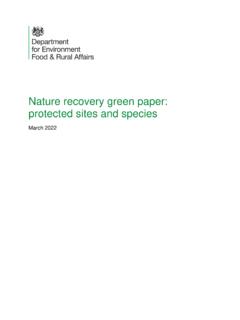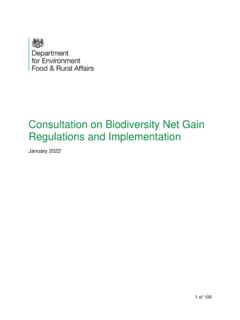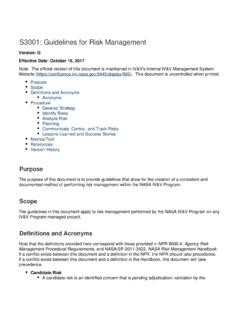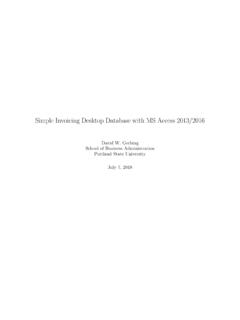Transcription of Consultation on the introduction of mandatory digital ...
1 Consultation on the introduction of mandatory digital waste tracking January 2022 Crown copyright 2019 This information is licensed under the Open Government Licence To view this licence, visit This publication is available at Any enquiries regarding this publication should be sent to us at: Contents Executive summary .. 1 Background .. 2 Why we are consulting .. 3 Associated 3 Responding to this Consultation .. 5 Duration .. 6 After the 6 About you .. 8 What will be tracked and what will it mean for you?
2 9 When waste tracking will not be required .. 14 Requirements for waste managed in other scenarios .. 14 What reporting regimes will be included in the service? .. 16 Information recorded on the waste tracking service .. 16 Recording treatment and product details .. 20 Dangerous goods regulations .. 21 Waste hierarchy .. 23 Ways to enter information .. 24 When information must be recorded .. 25 Roles and responsibilities .. 30 Digitally excluded requirements .. 34 Data retention, access, and confidentiality .. 37 Enforcement.
3 42 Regulatory 44 Charging .. 45 Implementation .. 49 Annex A: future mandatory digital waste tracking processes for non-hazardous and hazardous waste movements .. 52 Annex B: future mandatory digital waste tracking processes for Green List Waste exports .. 53 Annex C: future mandatory digital waste tracking processes for Green List Waste imports .. 54 1 Executive summary The case for action The UK is committed to moving towards a more circular economy, meaning we keep resources in use for as long as possible, extract maximum value from them, minimise waste and promote resource efficiency.
4 We need to be able to close the loop by turning the waste that does end up being produced, into a resource wherever possible. To do this we must ensure we have information about what waste is being produced and where it ends up. Over 200 million tonnes of waste is produced in the UK each year1 but there is currently no single or comprehensive way of tracking it, with legislation relating to the transport, management and description of waste being introduced separately over the last 30 or so years. Large amounts of data are either not collected or not collated centrally.
5 Multiple IT systems collect certain elements of waste tracking data. Some are paper-based, others digital , some are run by private contractors, others by the government, and where use of existing central digital systems is non- mandatory , take up is very low. As a result, it is very difficult to determine what happens to our waste and to have a comprehensive understanding of whether it has been recycled, recovered, or disposed of. Joining these fragmented systems up and replacing paper-based record-keeping will make it much easier and less time consuming for legitimate waste companies to comply with reporting requirements whilst making it much harder for rogue operators to compete in the industry and commit waste crime including fly tipping, deliberate misclassification of waste, illegal waste exports and the operation of illegal waste sites.
6 Under the current system, export of waste under Green List waste controls is a self-regulatory system; exporters of these wastes are not required to obtain consent or pay any charges to cover compliance monitoring. Consequently, exports of non-hazardous waste for recycling can leave England and Wales without the waste shipment regulators being aware who is exporting the waste, what is being exported and where it is going. There is a financial incentive to exploit the system by operators that cut costs by exporting contaminated or lower quality wastes, and by organised waste criminals that profit through illegally exporting poor quality wastes misdescribed as material suitable for recycling.
7 1 Defra's UK statistics on waste on 2 digital waste tracking will improve this, as this Consultation proposes that exporters will need to enter information about the proposed export in advance of it leaving the UK and will need to provide details of where it is going. This information will enable regulators to target interventions on waste exports more effectively and stop exports they believe are illegal or will be dealt with illegally. Background The governments across the UK have committed to implementing and mandating the digital recording of waste movements, subject to consultation2, and are committed to working with industry on the development of an electronic waste tracking system.
8 In 2020 as part of the GovTech Catalyst Challenge fund3, we developed prototypes of an electronic waste tracking service with two technology suppliers. This provided the groundwork for the development of the live service. The IT service development is supported by a user panel of around 1,200 members representing waste producers, carriers, brokers, dealers, waste site operators, local authorities, and regulators from across the UK. Members of this panel help to develop the service by participating in user research and testing the system as it is developed.
9 We want to make it easy to track waste and resources in real time throughout the economy and we are aiming to deliver a waste tracking service that is simple to use and provides value for all users. The waste tracking service will be developed in line with the UK government s guidance on using open standards4. We will use tools and infrastructure that is flexible, scalable, sustainable, and secure, designing the service based on user needs which have been developed and tested with the user panel. 2 Commitments in: HM Government Our Waste, Our Resources: A Strategy for England (2018), Scottish Government Securing a green recovery on a path to net zero: climate change plan 2018-2032 update (2020) and Making Things Last: a circular economy strategy for Scotland (2016), and the Llywodraeth Cymru/Welsh Government Beyond Recycling: A strategy to make the circular economy in Wales a reality (2021) 3 Department for Environment, Food & Rural Affairs Waste management.
10 Smart tracking of waste (GovTech Catalyst) (2019) 4 Cabinet Office Policy Paper Open Standard principles (2018) 3 Why we are consulting The Environment Act 20215 provides governments across the United Kingdom with the powers to introduce regulations to establish an electronic system for tracking waste. The legislation allows for those regulations to require certain information relevant to waste tracking to be recorded onto the system and contain provisions on several areas including: accessing the data on the waste tracking system fees and charges exemptions and alternative requirements for digitally excluded persons offences and sanctions The purpose of this Consultation is to present and seek thoughts on our proposals for this.
